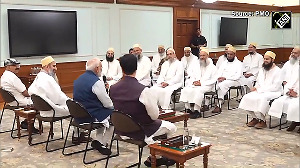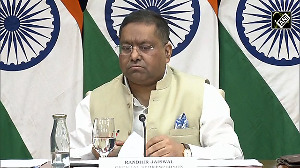The second Pravasi Bharatiya Divas, which ended on Sunday, sent out the strongest signal from India about its intent to keep the Diaspora engaged in the quest to emerge as a regional and global power, especially in the economic front.
That intent, with much stress on the big bucks, also turned out be the depressing factor of the second Diaspora meet, with the majority of the pravasis, spread across Africa, Caribbean islands and Gulf region feeling left out in India's bull run on the global space.
Prime Minister Atal Bihari Vajpayee chose the inauguration of PBD to announce two major economic initiatives -- To allow Indian companies to invest up to 100 per cent of their net worth in foreign companies and allow Indian agricultural companies to go global.
Vajpayee inaugurated the meeting proclaiming the 'arrival on the world stage of a Shining India, an India that has resolved to regain her past glory and indeed surpass it, an India that will both be an economic powerhouse and a major contributor to humanity's all-sided evolution to a higher level'.
Over 1000 delegates from over 60 countries sat buoyant in the Indira Gandhi Indoor stadium, as Vajpayee delivered the words. The confidence of the progeny of Indians, who were shipped out to British colonies in the 19th century, was visible as they walked in for inauguration representing Trinidad and Tobago to Guyana to Fiji.
The authority and respect IT professionals and suave entrepreneurs of Indian origin command in Europe and the US was apparent.
What started with a breathtaking jugalbandi between L Subramaniam and Ustad Sultan Khan winded up through speeches like the one by L K Singhvi, which went overboard in showering praise on Prime Minister Vajpayee, and the one by Yashwant Sinha who tried to hard sell India's international image.
Ultimately the feel good factor that the NDA government is trying to project pierced through nostalgia, sentiments and even serious business intents.
It was 'Incredible India' and 'India Shining' that were the dominant theme at the venue. Last year's chaos gave way to more organised meetings this year. The vast expanse of Pragati Maidan played venue last year, this year it was between basically the indoor stadium and the compact Vigyan Bhawan.
There was also a determined attempt from the part of the organisers to improve the styling of the meetings after the inaugural session. Last year the complaint was that the delegates were forced to sit through long meetings without much participation. But this year it was not supposed to be so, organisers claimed.
The food and ambience were impressive. In fact the spread of Indian food variety impressed almost every delegate who thoroughly enjoyed it. There was music, dance and other folk items to keep the delegates regaled at meal times. In fact on the last day yesterday, after a heavy lunch, several delegates broke into dances at the lunch venue.
For all the good things, the festival also had its share of brickbats. There was a noticeable drop in the number of delegates for this year's PBD. What was more revealing was the fact that several big names from Indian Diaspora skipped the meet though some of them were in India itself. Salman Rushdie, Shashi Tharoor and Amartya Sen were in India but they all stayed away. VS Naipaul, whose participation was being touted as a coup by the organisers, also stayed away.
So the intellectual debates and insightful speeches of last year were missing. The quality of the discussions dropped. There were some instances when the speakers, especially those from the rightwing family, went overboard in trying to please the NRIs.
There were few speeches where some Diaspora delegates were visibly lecturing down to the Indians. But that were bound to happen.
Absence of a variety of Indian political opinions was also noticed. Opposition leaders kept away. Jyotiraditya Scindia, the young Congress leader who chaired a session on Diaspora youth, was the only prominent opposition leader who attended the meet. As if the absence of opposition was a blessing, Deputy Prime Minister L K Advani even appealed for votes in the next Lok Sabha elections during his speech.
There were several positive developments. A strong contingent of Gulf NRIs attended the meet. It is the Gulf NRIs, most of who are blue collared workers, who pump back money to India. Vajpayee confirmed in his speech that some 50 per cent of Rs 55,000 crore of NRI remittance to India is from Gulf workers from the state of Kerala.
But the Gulf contingent returned disappointed.
Advocate Y A Rahim, president of the Indian Association, Sharjah, said though there was a special session on the NRIs in Gulf they got to hear 'what we have been hearing for so many years'.
"There were no effort on the part of the government to improve our plight," a disappointed Rahim said. He pointed out demands such as budget flights between India and Gulf have been ignored and Air India and Indian Airlines are charging 'much more than even normal international fares'.
There were other disappointed faces as well.
Fyard Hosein, a leading lawyer and a former member of Trinidad and Tobago Parliament, felt that India was putting all its focus and energy on the Diaspora from Europe and the US. "We are also successful professionals and businessmen in our countries," Hosein told rediff.com
He pointed out that both the PIO card and dual citizenship keep out the entire Diaspora who are settled in African countries, in Caribbean Islands and countries such as Fiji.
The PIO card, and according to available indications even dual citizenships, are available only up to the fourth generation -- ie at least one of the great grandparents should have been born in India.
But the vast majority of Indian Diaspora, descendents of the indentured labourers, are now into fifth and sixth generations, point out Hosein.
Kenya's Fitz Remedios Santana De Souza, one of the 12 eminent people to be awarded with Pravasi Bharatiya Samman, complained how India's daily laws are a hindrance to those who want to invest in India.
Pointing out that with the PIO/Dual citizenship not available to the African countries, it was doubly difficult for people like him to invest in India. "How do we buy property, or even get a driving licence in India?" he asks.
Not that they didn't benefit out of the festival. Hosein says despite the concerns the meet also provides great opportunities to meet up with Diaspora members from around the globe.
"We wish we got to see more of Diaspora," remarked Omatie Lyder, managing editor of the Trinidad Express about the cultural programmes, which were dominated by artistes from within India.
Lyder, the attractive and assertive editor of the Trinidad Express, spoke for the entire Diaspora when she pointed out that India needs to make major strides to attain big power status. "Look at Delhi. It is a bustling city of course, but it doesn't have the finesse of a world class city," Lyder said.
Such lack of finesse, not just in the city but also among bureaucrats and political class of India, remains the principle concern of the Diaspora. India's secular future, its poor, its corrupt politicians, its obstructionist bureaucracy, its under-developed infrastructure, its poor communication networks are all among the concerns of the Diaspora, whether they are successful techies of the West or struggling blue collar workers of the Gulf.







 © 2025
© 2025